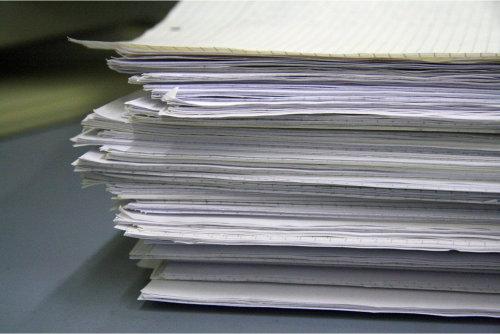Whether it is the mail being delivered to your door,
paperwork brought home from school and work, medical forms, magazines, receipts, etc. paper piles continue to grow on a daily basis. Here are a few ideas to diminish that pileup of paper and keep it manageable before it gets the better of you.
1. Make organizing your paperwork a priority.
Include it in your schedule and set aside a certain amount of time each day to process paperwork. Open and sort mail on a daily basis. Immediately recycle anything you do not need. Keep and handle all important documents in one designated area. Divide the papers into main categories of action like Read, Pay, File and Do.
2. Don't procrastinate on paper decisions. Do not put papers into a big pile and say you will deal with it later. Do something with it now and take action, whether it is to read it, pay it, file it, do it, or toss it.
3. Think
before you print. Computers have not lessened the amount of paper clutter. In fact, in many cases, they have increased it. People are printing out a lot of things that do not have to be printed. If it is not critical, do not print it out. That information will more than likely still be available to reference again.
4. Use a binder system to keep paper together. The Get Organized Now! Easy Organizer holds all the important information you need to keep on hand in one handy location. Binders are a great way to organize birthdays, cleaning routines, goals, TO DOs, exercise logs, recipes, calendars, time logs, and more. 5. Create a message taking
system. Instead of having scraps of paper and Post-it notes all over the place, use a spiral notebook for saving phone messages for family members. If they're wondering if someone called on the home phone, they can just check the notebook.
6. Before you put documents into storage,
mark them with an expiration date, if they have one. There are some documents you do need to keep permanently, like deeds and passports. But know when it's time to
purge other documents so you don't keep adding to the paper monster. 7. Evaluate your current magazine and newspaper subscriptions. Only continue the subscriptions that you read on a regular basis.
Donate old magazines to senior centers, shelters, or doctors offices after you have read them. Keep in mind that more and more magazines these days carry many of their articles, if not the whole issue, online. You can also subscribe to a digital magazine subscription service, which eliminates the paper altogether.
To be continued tomorrow. Stay tuned!












